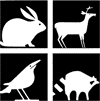Center, Internet, Wildlife Damage Management

Wildlife Damage Management Conference Proceedings
Date of this Version
10-5-2000
Document Type
Article
Abstract
Co-management of white-tailed deer (Odocolius virginianus) holds the promise of creating better management programs in many situations, but agencies may be reluctant to encourage co-management if they doubt the capacity of a community to take on management responsibilities, especially on a continuing basis. In Cayuga Heights, New York, the New York State Department of Environmental Conservation worked with Cornell University and Cornell Cooperative Extension to help a community organization create informed public dialogue about local deer management. Using a consensus-building conceptual framework, we analyzed the planning process that created this dialogue. Process participants believed that use of a third party facilitator and access to expertise outside the community contributed to empowerment of the local community and a more effective working relationship between stakeholders in the community. This experience demonstrates how a wildlife agency in partnership with other entities can help build capacity that communities will need to become deer management partners. We suggest that agencies can increase community capacity by: (1) linking community involvement processes to formal decision-making authority and (2) developing a network of facilitators and people with expertise in biological and social science to support consensus-building initiatives.

